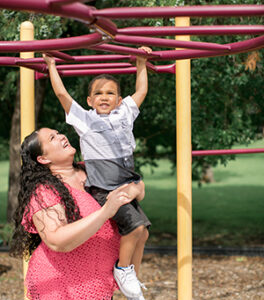More than nine out of 10 single parents enrolled in Buckner Family Pathways complete the program—an achievement that not only improves their lives but also helps break the cycle of generational poverty, Buckner officials assert.
Buckner Family Pathways seeks to help single parents set and reach educational goals and achieve financial self-sufficiency.
In Texas, more than one-third of all children—about 1.9 million—live in single-parent households, and 42 percent of Texas families living in poverty are headed by single mothers.

Buckner Family Pathways provides participants and their children stability and security by offering reduced-rate housing in a safe place and child-care assistance.
Single parents—almost always single mothers—in Buckner Family Pathways receive access to counseling services, spiritual enrichment and mentorship, along with training in parenting skills, money management, communication and conflict resolution.
The program helps protect vulnerable families from domestic abuse, financial uncertainty and the risk of homelessness while helping them learn to set and achieve goals.
Last year, Buckner Family Pathways posted a 93.9 percent success rate as measured by program completion, Buckner Children and Family Services announced March 20.
‘We consider it a ministry’
“That’s a new record for us,” said Marisa Phillips, senior director for Buckner Family Pathways.

While “apple-to-apple” comparisons with similar programs for single parents are difficult because most are more limited in scope than Buckner Family Pathways, Phillips said, an informal study several years ago showed the national success rate was closer to 20 percent.
Sign up for our weekly edition and get all our headlines in your inbox on Thursdays
“One thing that sets Buckner Family Pathways apart is that we are a faith-based program,” said Phillips, who has worked with the program 22 years. “We consider it a ministry.”
Participants are encouraged—but not required—to attend church services, and members of local churches are provided opportunities to interact meaningfully with clients, she noted.

Mentors, family coaches and case workers encourage single mothers and help them take each step on the path toward achieving self-sufficiency, she added.
“For first-time college students, enrollment can be a daunting process,” Phillips said. “We try to set them up for success, letting them know there is someone walking alongside them.”
Buckner Family Pathways participants are considered to have completed the program when they earn a degree or certificate from an educational institution, transfer to a higher education program, or achieve sustainable employment and financial self-sufficiency.
For some single mothers, self-defined success means completing a college degree or vocational training certificate they previously considered unattainable. For others, it means setting and achieving goals in terms of savings, salary or home ownership.
‘Breaking the generational cycles’
Last year, participants also reported a 94 percent satisfaction rate with the program in meeting Buckner Family Pathways’ self-defined standards of quality for strengthening and supporting families.

In addition to tracking program completion and participants’ satisfaction, Buckner also monitors graduates to see how many maintain self-sufficiency 90 days after graduation.
“It’s too early to report on our sustained self-sufficiency rates for last year, but we are all extremely proud of our graduates from 2021 who were able to achieve a 92 percent sustained self-sufficiency rating,” said Kandyce Ormes-Ripley, associate vice president of data analytics and strategy for Buckner International.
“This number is evidence that the single-parent graduates of Buckner Family Pathways are truly breaking the generational cycles of poverty for themselves and their children.”
Mothers who were survivors of abuse and neglect, who experienced homelessness or who grew up in the foster care system not only find jobs, but also achieve career goals they previously considered unattainable, she said.
“Now these mothers are doctors, teachers, counselors and social workers,” Ormes Ripley said.
Track record of generational impact
Buckner Family Pathways began in 1997 at a single site in Lufkin. Last year, it served 166 Texas families in Amarillo, Dallas, Houston, Longview, Lubbock, Lufkin and Midland. A single parent typically is enrolled in Buckner Family Pathways two to four years, and 31 graduated last year.
On the 20th anniversary of Buckner Family Pathways in Lufkin, the agency reached out to graduates to see how they—and their now-adult children—were doing, Phillips noted.
Of those who responded, more than 90 percent of the individuals whose mothers had completed Buckner Family Pathways also went straight from high school to attend either an institution of higher education or entered vocational training, she said.
“There were no reports of substance abuse, homelessness or criminal activity,” Phillips said.
Children who grow up in Buckner Family Pathways households see their mothers setting goals and working hard to achieving them, she noted.
“They grow up seeing that mom does her homework,” she said.
They also grow up in households where mom expects her children to complete their school work, she added.
“The biggest thing about the program is the generational impact,” Phillips said. “For every one family that is affected directly, the impact is multiplied as the children in those households grow up and influence the next generation. It’s exponential. There’s no better investment.”
















We seek to connect God’s story and God’s people around the world. To learn more about God’s story, click here.
Send comments and feedback to Eric Black, our editor. For comments to be published, please specify “letter to the editor.” Maximum length for publication is 300 words.